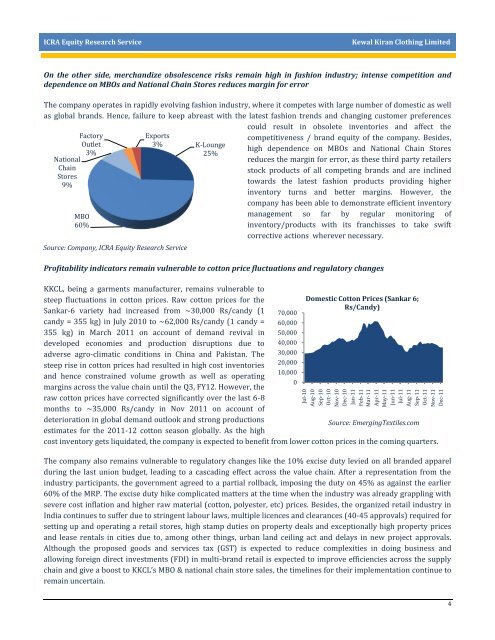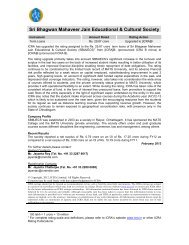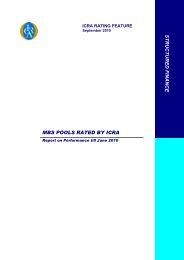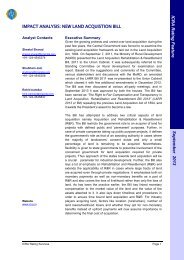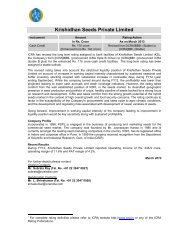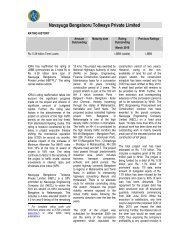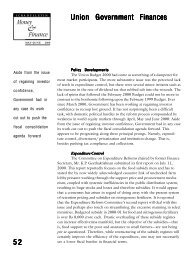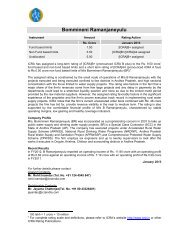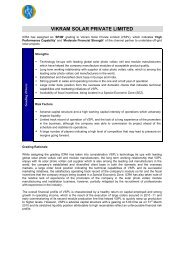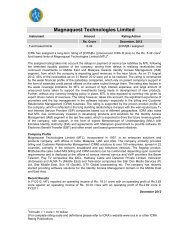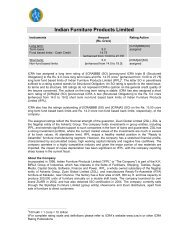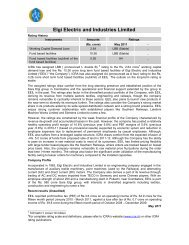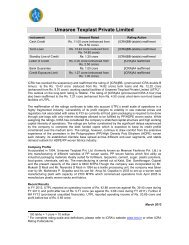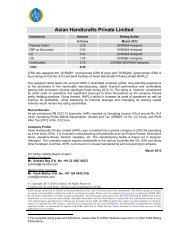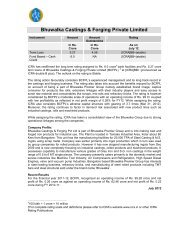Create successful ePaper yourself
Turn your PDF publications into a flip-book with our unique Google optimized e-Paper software.
Jul-10<br />
Aug-10<br />
Sep-10<br />
Oct-10<br />
Nov-10<br />
Dec-10<br />
Jan-11<br />
Feb-11<br />
Mar-11<br />
Apr-11<br />
May-11<br />
Jun-11<br />
Jul-11<br />
Aug-11<br />
Sep-11<br />
Oct-11<br />
Nov-11<br />
Dec-11<br />
<strong>ICRA</strong> Equity Research Service<br />
<strong>Kewal</strong> <strong>Kiran</strong> <strong>Clothing</strong> <strong>Limited</strong><br />
On the other side, merchandize obsolescence risks remain high in fashion industry; intense competition and<br />
dependence on MBOs and National Chain Stores reduces margin for error<br />
The company operates in rapidly evolving fashion industry, where it competes with large number of domestic as well<br />
as global brands. Hence, failure to keep abreast with the latest fashion trends and changing customer preferences<br />
Factory<br />
Outlet<br />
3%<br />
National<br />
Chain<br />
Stores<br />
9%<br />
MBO<br />
60%<br />
Exports<br />
3%<br />
Source: Company, <strong>ICRA</strong> Equity Research Service<br />
K-Lounge<br />
25%<br />
could result in obsolete inventories and affect the<br />
competitiveness / brand equity of the company. Besides,<br />
high dependence on MBOs and National Chain Stores<br />
reduces the margin for error, as these third party retailers<br />
stock products of all competing brands and are inclined<br />
towards the latest fashion products providing higher<br />
inventory turns and better margins. However, the<br />
company has been able to demonstrate efficient inventory<br />
management so far by regular monitoring of<br />
inventory/products with its franchisses to take swift<br />
corrective actions wherever necessary.<br />
Profitability indicators remain vulnerable to cotton price fluctuations and regulatory changes<br />
KKCL, being a garments manufacturer, remains vulnerable to<br />
steep fluctuations in cotton prices. Raw cotton prices for the<br />
Domestic Cotton Prices (Sankar 6;<br />
Sankar-6 variety had increased from ~30,000 Rs/candy (1 70,000<br />
Rs/Candy)<br />
candy = 355 kg) in July 2010 to ~62,000 Rs/candy (1 candy = 60,000<br />
355 kg) in March 2011 on account of demand revival in 50,000<br />
developed economies and production disruptions due to 40,000<br />
adverse agro-climatic conditions in China and Pakistan. The 30,000<br />
steep rise in cotton prices had resulted in high cost inventories 20,000<br />
and hence constrained volume growth as well as operating<br />
10,000<br />
margins across the value chain until the Q3, FY12. However, the<br />
0<br />
raw cotton prices have corrected significantly over the last 6-8<br />
months to ~35,000 Rs/candy in Nov 2011 on account of<br />
deterioration in global demand outlook and strong productions<br />
Source: EmergingTextiles.com<br />
estimates for the 2011-12 cotton season globally. As the high<br />
cost inventory gets liquidated, the company is expected to benefit from lower cotton prices in the coming quarters.<br />
The company also remains vulnerable to regulatory changes like the 10% excise duty levied on all branded apparel<br />
during the last union budget, leading to a cascading effect across the value chain. After a representation from the<br />
industry participants, the government agreed to a partial rollback, imposing the duty on 45% as against the earlier<br />
60% of the MRP. The excise duty hike complicated matters at the time when the industry was already grappling with<br />
severe cost inflation and higher raw material (cotton, polyester, etc) prices. Besides, the organized retail industry in<br />
India continues to suffer due to stringent labour laws, multiple licences and clearances (40-45 approvals) required for<br />
setting up and operating a retail stores, high stamp duties on property deals and exceptionally high property prices<br />
and lease rentals in cities due to, among other things, urban land ceiling act and delays in new project approvals.<br />
Although the proposed goods and services tax (GST) is expected to reduce complexities in doing business and<br />
allowing foreign direct investments (FDI) in multi-brand retail is expected to improve efficiencies across the supply<br />
chain and give a boost to KKCL’s MBO & national chain store sales, the timelines for their implementation continue to<br />
remain uncertain.<br />
4


